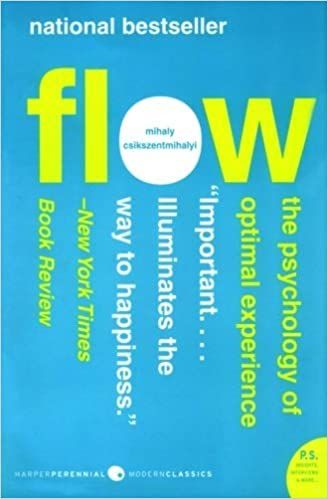‘Flow: the psychology of optimal experience’ by Mihaly Csikszentmihalyi

This an interesting read that dives into the elements/conditions required to experience flow in an optimal experience where there is a sense of seemingly effortless movement and time flies by or stands still. Its intent is to use some of the tools of modern psychology to explore the very ancient question: When do people feel most happy? Happiness is a result of how we interpret different events and experiences, and is achieved through control over one’s inner life. In essence striving to improve the quality of your life and make it more satisfying.
“What I “discovered” was that happiness is not something that happens. It is not the result of good fortune or random chance. It is not something that money can buy or power command. It does not depend on outside events, but, rather, on how we interpret them. Happiness, in fact, is a condition that must be prepared for, cultivated, and defended privately by each person. People who learn to control inner experience will be able to determine the quality of their lives, which is as close as any of us can come to being happy.”
“ ...the phenomenology of enjoyment has 8 major components:-
- The experience usually occurs when we confront tasks we have a chance of completing;
- We must be able to concentrate on what we are doing;
- The concentration is usually possible because the task undertaken has clear goals;
- And provides immediate feedback;
- One acts with a deep but effortless involvement that removes from awareness the worries and frustrations of everyday life;
- Enjoyable experiences allow people to exercise a sense of control over their actions;
- Concern for the self disappears, yet paradoxically the sense of self emerges stronger after the flow experience is over.
- The sense of the duration of time is altered; hours pass by in minutes, and minutes stretch out to seem like hours.
The combination of all these elements cause a sense of deep enjoyment that is so rewarding people feel that expending a great deal of energy is worthwhile simply to be able to feel it.”
A key thread throughout the book is the term optimal experience which is something we make happen and usually occurs when a person’s body or mind is stretched to its limits in a voluntary effort to accomplish something difficult and worthwhile. A big part of this is understanding the Challenge-Skill quadrant and the fine balance between the challenge of a task and the skill(s) needed to complete the task. Tip the balance and tasks will become meaningless or too complex and people will become anxious or bored. Get the conditions right then you will experience flow but with the situation being dynamic you can easily move outside the state of flow if you stand still. Therefore, there needs to be progression in the challenge or the development of higher skills to maintain flow.
“Flow is the state in which people are so involved in an activity that nothing else seems to matter; the experience itself is so enjoyable that people will do it even at great cost, for the sheer sake of doing it.”
So the essential steps in the process to produce flow are:-
- To set an overall goal, and as many subgoals as are realistically feasible;
- To find ways of measuring progress in terms of the goals chosen;
- To keep concentrating on what one is doing, and to keep making finer and finer distinctions in the challenges involved in the activity;
- To develop the skills necessary to interact with the opportunities available;
- To keep raising the stakes if the activity becomes boring.
The concepts shared throughout the book are applicable to teachers in the classroom, coaches on the sports field, and mangers at work. Basically anyone wishing to create the right environment where people will be happy, work hard and have fun. With the unprecedented times we are currently experiencing, and the unknown impact this will have on peoples’ wellbeing in the future, the principles of flow will be a very useful addition to settings to help people be happy/become happier when we transition in to the new normal in the short-term and maintain a state of flow across the long-term.